The Defunding Debate
Maurice Gordon, 27, appeared to be in crisis when he left his Poughkeepsie, NY home after 3 a.m. on May 22. A friend called 911, saying he was concerned about Gordon’s mental state but also worried what police might do.
“I just don’t want him to get hurt or anything,” he said, adding, “Please don’t shoot.”
A little over 24 hours later, Gordon was dead, shot six times by a New Jersey State Police sergeant on the side of the Garden State Parkway. It was his fourth encounter with police in a little over three hours.
The Defunding Debate: A Cry for Help
The Defunding Debate: A Model System?
The Defunding Debate: Different Visions
“They killed my son and it’s a cruelty,” says Gordon’s mother, Raquel Barrett.
“If Maurice Gordon were white, Maurice Gordon would still be alive,” says attorney William Wagstaff, who is representing the family.
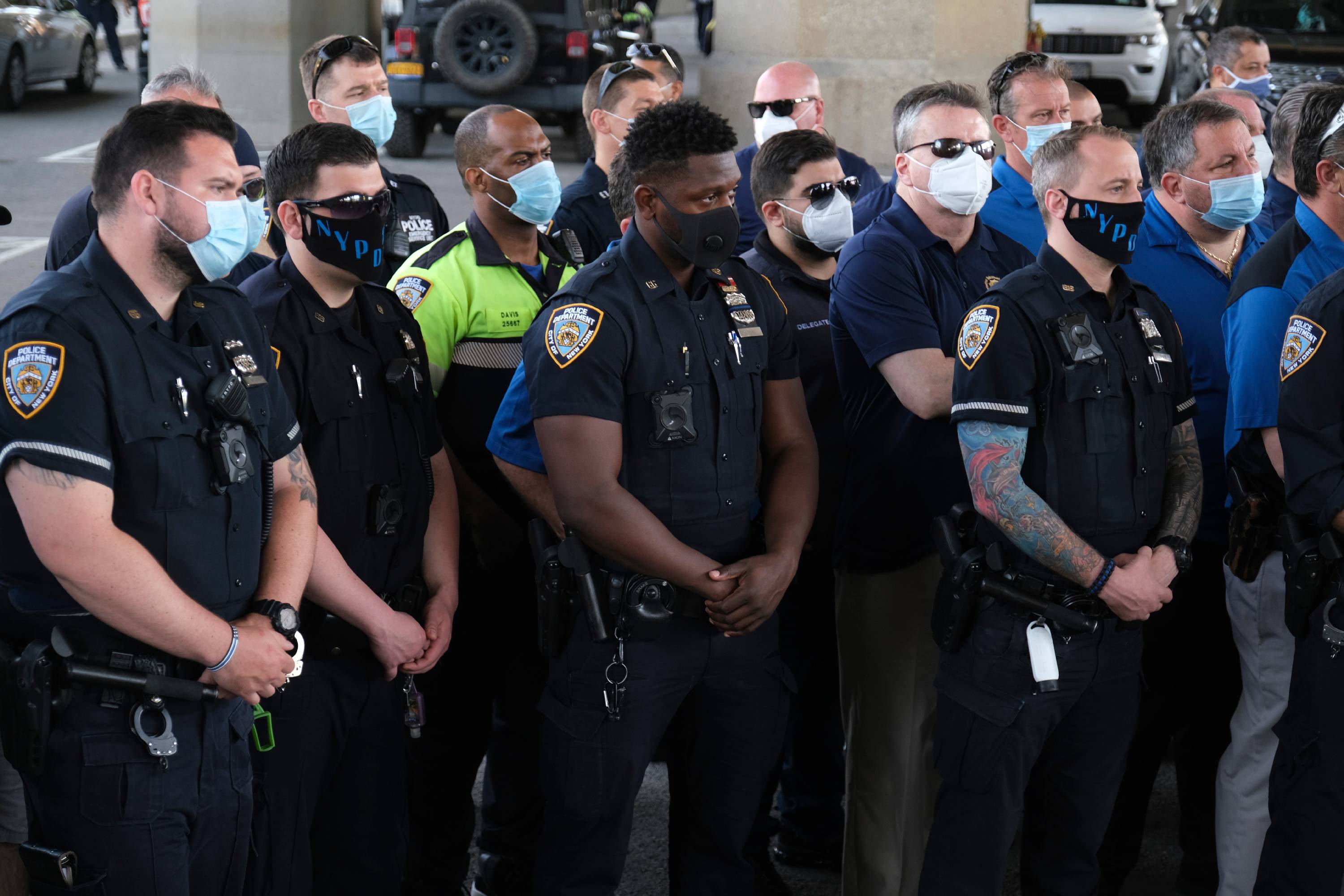
Law enforcement officers and supporters listen to people speak during a news conference in New York. (AP Photo/Seth Wenig)
At 26, Xavier Ingram of Camden is paralyzed from the neck down.
“For the past six years I’ve spent my life on my back,” Ingram says, in a video statement to Kane In Your Corner. “I live in a nursing home and I’m cared for like a baby”
Police officers put their knee on my neck.
Ingram’s neck was broken in 2014, in an incident similar to the George Floyd case in Minnesota.
“Police officers put their knee on my neck,” he says.
Extended Interview: Jamai Ingram, Xavier Ingram's Sister
“Our police officers did nothing wrong,” says Camden County Freeholder Director Lou Cappelli.
Gordon and Ingram are examples of why some activists say America should defund the police.
“Perhaps Maurice needed mental health crisis intervention and not someone with a gun, badge and license to murder him when there are alternatives,” says Philip McHarris, a civil rights scholar at Yale University and Black Lives Matter activist.
Our police officers did nothing wrong.
While there’s no precise consensus on what defunding means, advocates say at the very least, it entails spending less on law enforcement and more on crime prevention.
“Schools, employment, hospitals, housing, health care, we all know that these things actually are more preventative than police can ever be,” McHarris says.
AUDIO: Maurice Gordon's friend calls 911 Part 1 (SINGLE CLICK OR TAP TEXT TO STOP AND START AUDIO) AUDIO: Maurice Gordon's friend calls 911 Part 2 (SINGLE CLICK OR TAP TEXT TO STOP AND START AUDIO)
Additional video and media available at the New Jersey Attorney General's website.
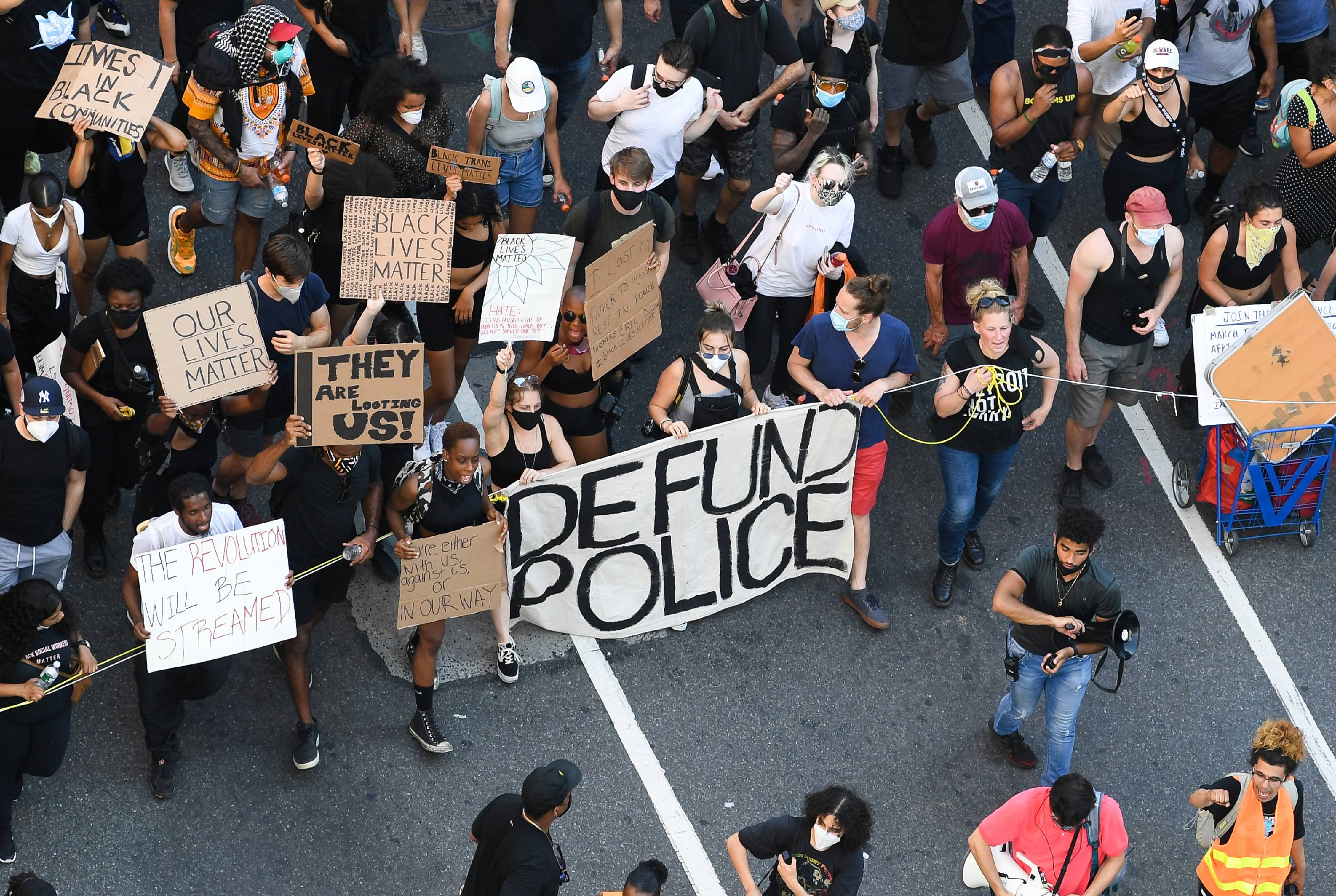
Overhead view of an anti-police brutality Black Lives Matter protest rally on Third Avenue, Tuesday, June 9, 2020, in New York. (Photo by Evan Agostini/Invision/AP)
Police disagree. “Look, the basic premise of policing is more cops equals less crime,” says Patrick Colligan, head of the New Jersey State PBA.
Still, Colligan admits his officers are often ill-equipped to handle people in crisis.
“You've made us the psychologists and the psychiatrists, but you haven't given us the training to deal with that group,” he says.
On the morning of May 23, Gordon ran out of gas shortly after 3 a.m. on the Garden State Parkway in Brick. Police video shows a state trooper asked where he’s going and Gordon replied, “to the real world.” The tow truck driver sold him two gallons of gas and advised him to refuel.
You've made us the psychologists and the psychiatrists, but you haven't given us the training to deal with that group.
Gordon apparently didn’t. Just before 5 a.m., he ran out of gas again on the Parkway near Waretown. A passerby drove him to a convenience store, where he bought two cans of gas.
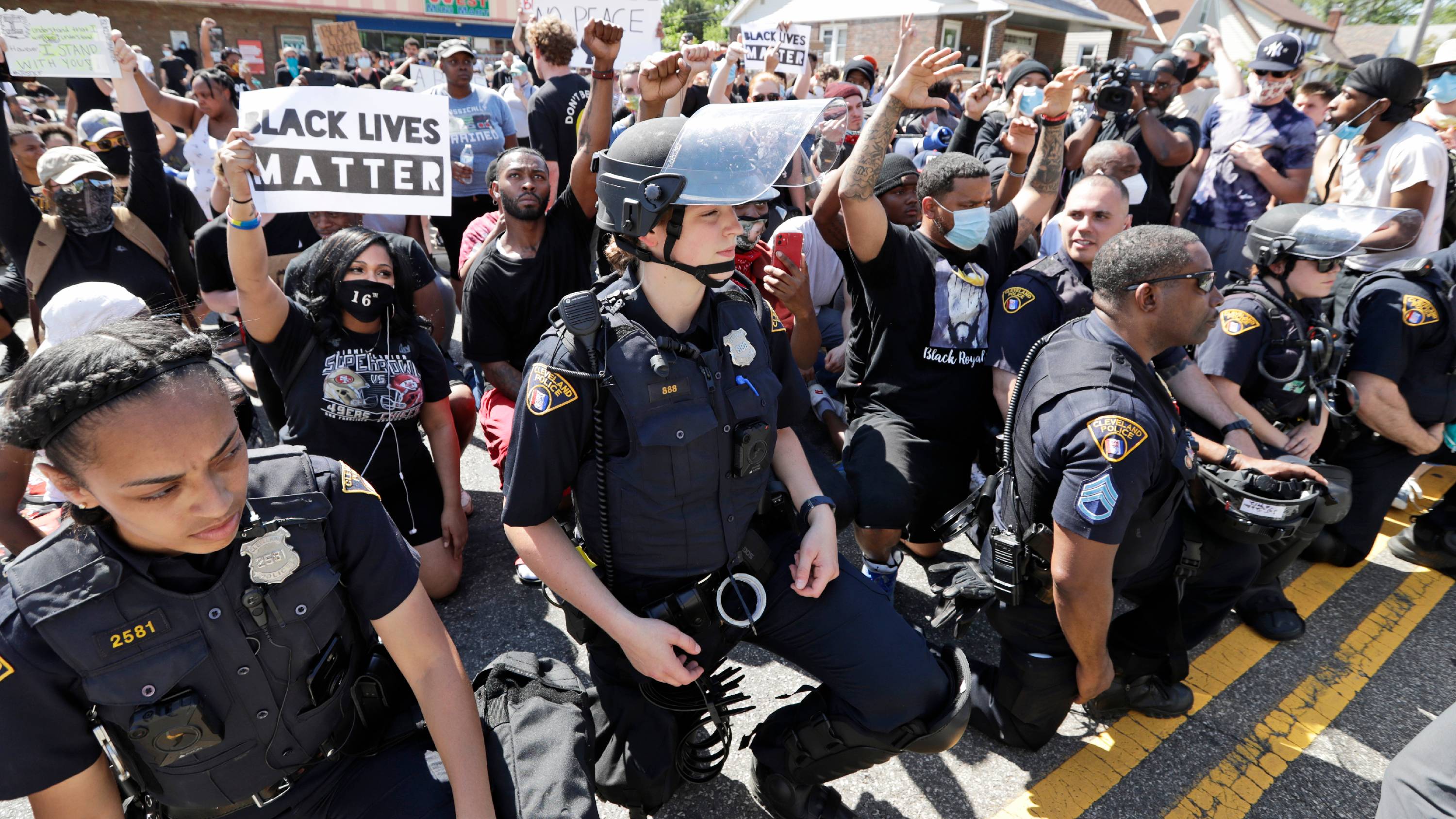
Cleveland police officers and protesters take a knee together during a rally for black lives, in Cleveland. (AP Photo/Tony Dejak)
At 6:13 a.m., Gordon was pulled over by a state trooper for driving 101 mph on the Parkway near Stafford. Police video shows a trooper asked where he was going; Gordon replied, “The end of the video game.” The trooper administered a field sobriety test, wrote a ticket and let Gordon continue.
At 6:26 a.m., Sergeant Randall Wetzel pulled Gordon over for driving 110 mph on the Parkway near Bass River. His car would not re-start so Wetzel ordered another tow and waited on the scene. But Gordon kept getting out of his car on the busy roadway so Wetzel invited him to sit in his police vehicle until the tow truck driver arrived.
While waiting, the sergeant quizzed Gordon about his destination. Gordon seemed not to understand the questions. Wetzel asked if Gordon was on medication. Gordon said no.
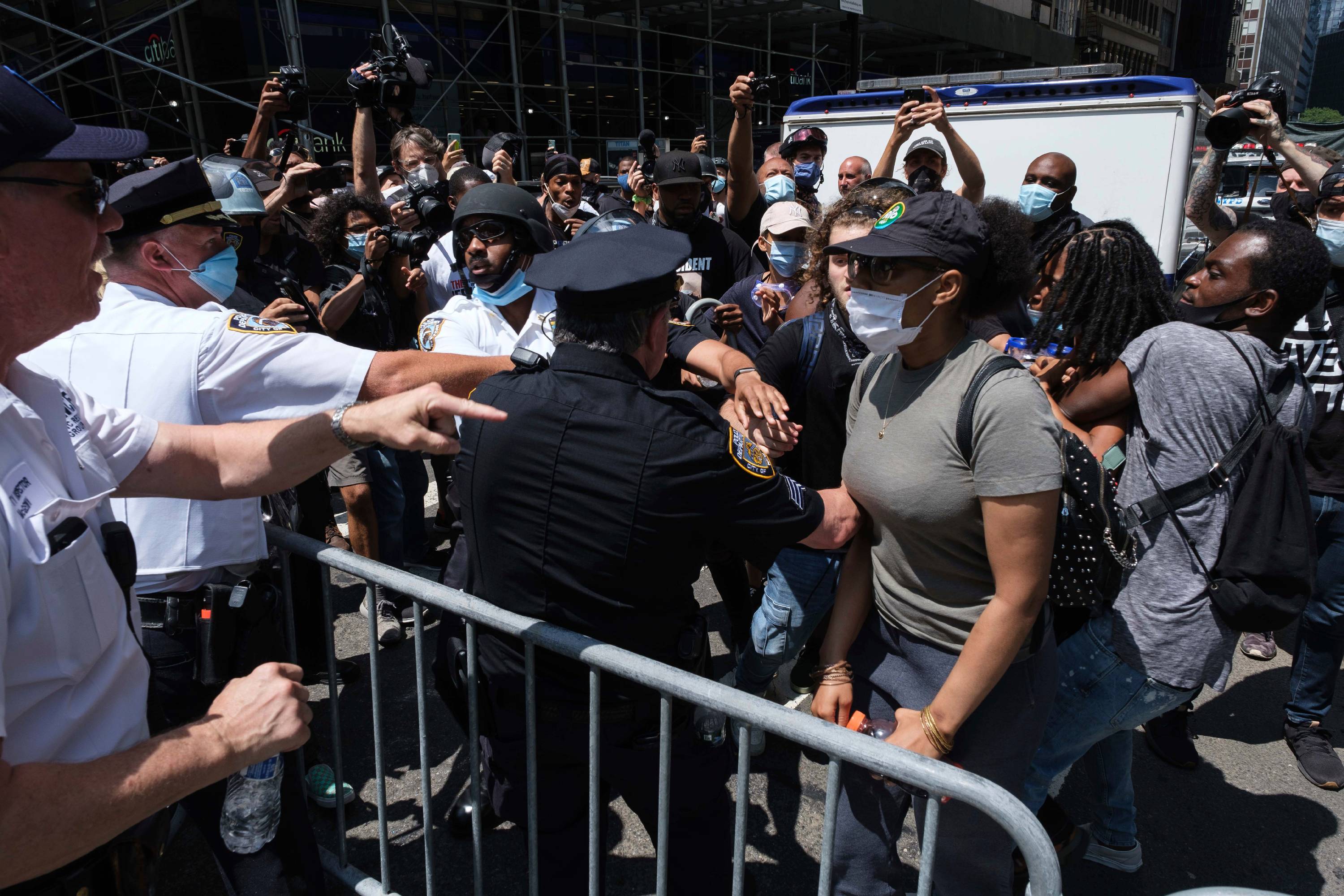
Black Lives Matter protesters confront NYPD officers during a protest near City Hall Park, Wednesday, July 15, 2020, in New York. (AP Photo/Yuki Iwamura)
McHarris says many routine encounters with police can easily escalate and should be avoided. He recommends the use of “traffic interveners” for traffic stops and disabled vehicles, and “safety interveners” for people in crisis who don’t present an imminent threat.
New Jersey’s largest city is now exploring the use of alternatives to traditional policing. Newark Mayor Ras Baraka cut the public safety budget by 5% to create an Office of Violence Prevention and set up a Community Street Team to mediate disputes.
“Police respond to shootings; these guys try to prevent a shooting from taking place,” Baraka says. The crime rate has dropped steadily in Newark over the past decade. Baraka says that's proof “you don't have to have an army of police to reduce crime.”
New York City Mayor Bill DeBlasio is taking a similar approach, agreeing to pare $1 billion from the NYPD’s budget and apply much of the savings to the Department of Educaton.
Extended Interview: Phillip McHarris, Yale University
Extended Interview: NJ PBA President Pat Colligan
Extended Interview: Dan DiSalvo, CUNY Political Science
Are those cities “defunding the police”? Baraka, for one, says absolutely not. “We believe that violence is public health, and that the police are a part of the puzzle, they’re just not the whole puzzle,” he says.
What then, does, “defunding” mean?
Some advocates, like McHarris, call themselves “abolitionists” and say their goal is to create a new justice system that focuses more on “restorative justice” and less on a “culture of punishment.” To them, defunding is simply the first step in that process. Others, who say they support defunding, have more modest goals in mind.
“I think the ‘defund’ movement is currently about trying to reassess how much police are being asked to do, and how much their training is equipping them to do that,” says Professor Daniel DiSalvo, Chair of Political Science at City College of New York. “Such that when they do have interactions with citizens, these end up being pleasant, or as pleasant as they can be under obviously stressful and difficult circumstances.”
Extended Interview: Newark Mayor Ras Baraka
Colligan, the police union president, says cities that defund do so at their own risk because, “when you significantly reduce the actual manpower of an agency, crime goes up.”
He’s also frustrated by the criticism his officers receive. “If I walked into a plumber’s job and told them how to sweat a pipe, he’d laugh me out of there,” he says. “But you can watch one episode of NYPD Blue, and everybody's an expert on police policy and procedure”.
At 7:06 a.m. on May 23, Sgt. Wetzel opened the back door of his state police SUV to offer Maurice Gordon a face mask. Gordon attempted to get out. A struggle began.
Was it just a tragic event, an officer left with no choice but to fight for his life? Or the result of a flawed system that encourages violence, by putting police in situations they are not trained to handle?
“Get the F--- back in the car!” Wetzel can be heard screaming on the recording.
Gordon appears to have tried, twice, to climb into the driver’s seat. Wetzel later told a responding trooper he believed Gordon was trying to steal the vehicle and pepper sprayed him.
The two men wound up grappling behind the SUV. The video shows Gordon reaching for Wetzel’s gun.
Was it just a tragic event, an officer left with no choice but to fight for his life? Or the result of a flawed system that encourages violence, by putting police in situations they are not trained to handle?
Sergeant Wetzel fired six times. Gordon fell to the ground, fatally wounded.
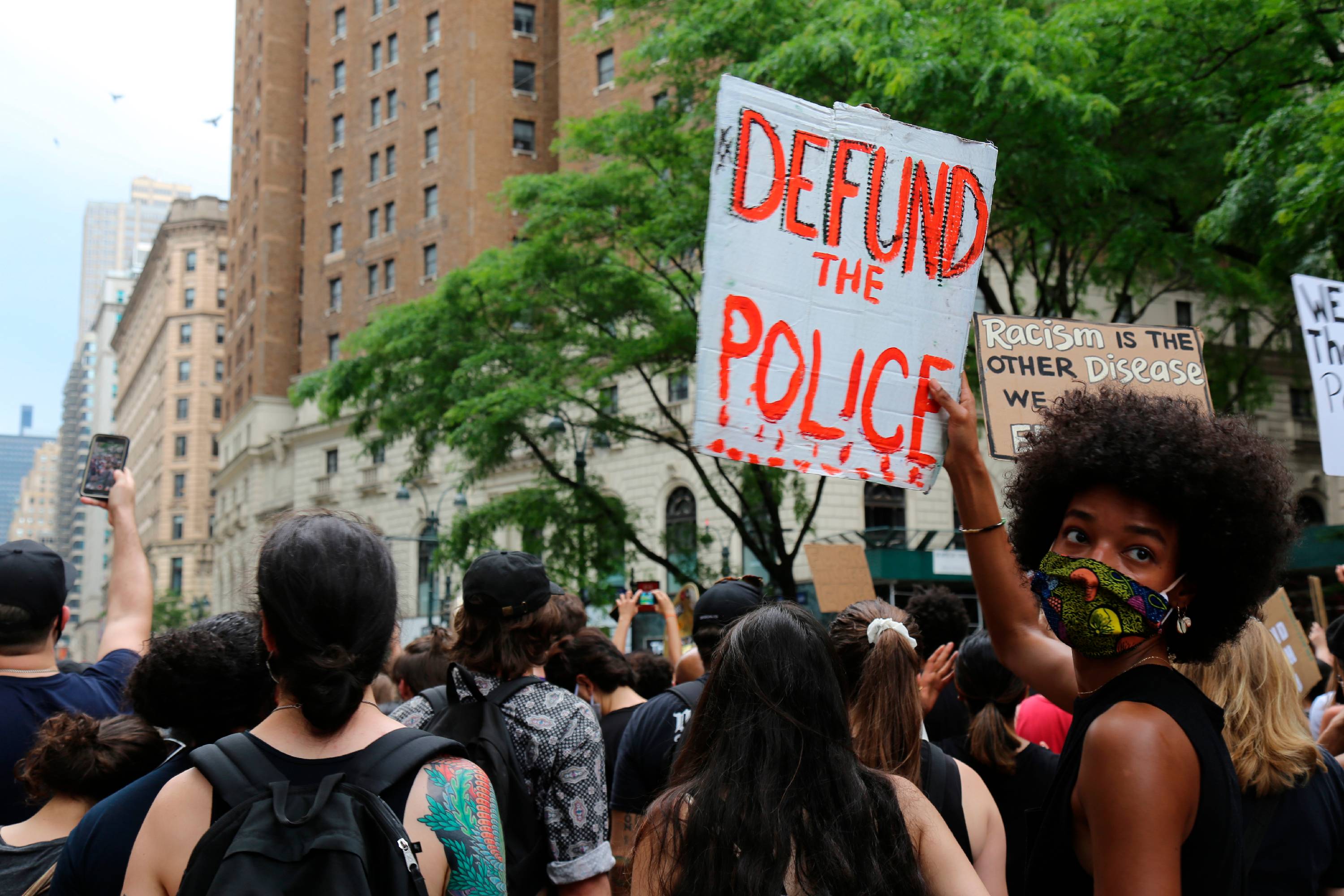
In this June 6, 2020, file photo, protesters march in New York. (AP Photo/Ragan Clark, File)
A Model System?Camden outsourced its police department to the county in 2013. The county-run force says brutality complaints plummeted 96% since then. But an exclusive Kane In Your Corner investigation finds the department is underreporting those numbers.
At age 26, Xavier Ingram lives in a nursing home and is paralyzed from the neck down. “I depend on others to wash me, feed me, change me,” he says.
What happened to Xavier was definitely an injustice, and I don't like the fact that no one, no one has been punished for it.
Ingram’s neck was broken when he was arrested in 2014. He alleges police officers knelt on his back and neck. He’s suing the department, alleging excessive force.
“What happened to Xavier was definitely an injustice, and I don't like the fact that no one, no one has been punished for it,” says Ingram’s sister, Jamai.
“That individual running away in a rainy night fell, slipped and fell over a curb, fell on his back and neck and that's how broke his neck,” Camden County Freeholder Director Lou Cappelli says.
Extended Video: Comments from Xavier Ingram
Extended Video: Xavier Ingram's Attorney Beth Baldinger
Security camera footage, shot from an "eye in the sky" perspective, shows Ingram fleeing from officers. He had an open arrest warrant. The video shows him slip and fall. Officers can be seen clustered around his fallen body. Ingram's family and attorney say they are kneeling on him. The county says they are handcuffing him and then attempting to provide assistance.
Ingram's attorney, Beth Baldinger, contends police injured her client when they punished him for running away.
“It's been known in the police field for years,” she says. “If you run from the police, they're going to ‘spank’ you, which is the infliction of excessive use of force, improper use of force, unjustified use of force to teach you a lesson.”
What might seem surprising about the Ingram case is where it happened. Camden has recently been hailed as a model of a city that defunded the police with nearly miraculous results. Kane In Your Corner found the truth is more complicated.
If you run from the police, they're going to ‘spank’ you, which is the infliction of excessive use of force, improper use of force, unjustified use of force to teach you a lesson.
In 2013, with a murder rate nearly 18 times the national average, Camden outsourced policing to the county. Crime has dropped by close to 40 percent. Police records show an even more impressive, 96-percent decline in excessive force complaints. There were 65 complaints in 2014, and just 3 each in 2018 and 2019.
Video: Xavier Ingram Surveillance Cam Footage
County officials credit that to a community policing effort that encourages relationships between police and residents, and to one of the strictest use-of-force policies in New Jersey, which states that “whenever feasible, officers should attempt to de-escalate confrontations.”
But Kane In Your Corner found that Camden County is also only reporting a fraction of its brutality complaints.
In February 2018, Edward Minguela was repeatedly punched in the head during an arrest that was captured on video. He filed complaints against each of the four Camden County Police officers involved. But the department’s annual internal affairs report shows only three complaints were received all year; that's less than Minguela filed in one day.
Camden County Police spokesman Dan Keashen insists “this is one complaint against four officers, not four separate excessive force complaints,” adding “this is semantics, plain and simple.”
But the Attorney General’s regulations specifically state that “If there are multiple officers involved in a situation, each officer who had a complaint filed against him or her is to be counted separately.”
“If there’s one complaint and there’s four individual officers, that equals four complaints,” says Rich Rivera, a police consultant who specializes in internal affairs.
“So they can’t have three excessive force complaints for the year?” News 12 New Jersey’s Walt Kane clarifies.
“Not possible,” Rivera says.
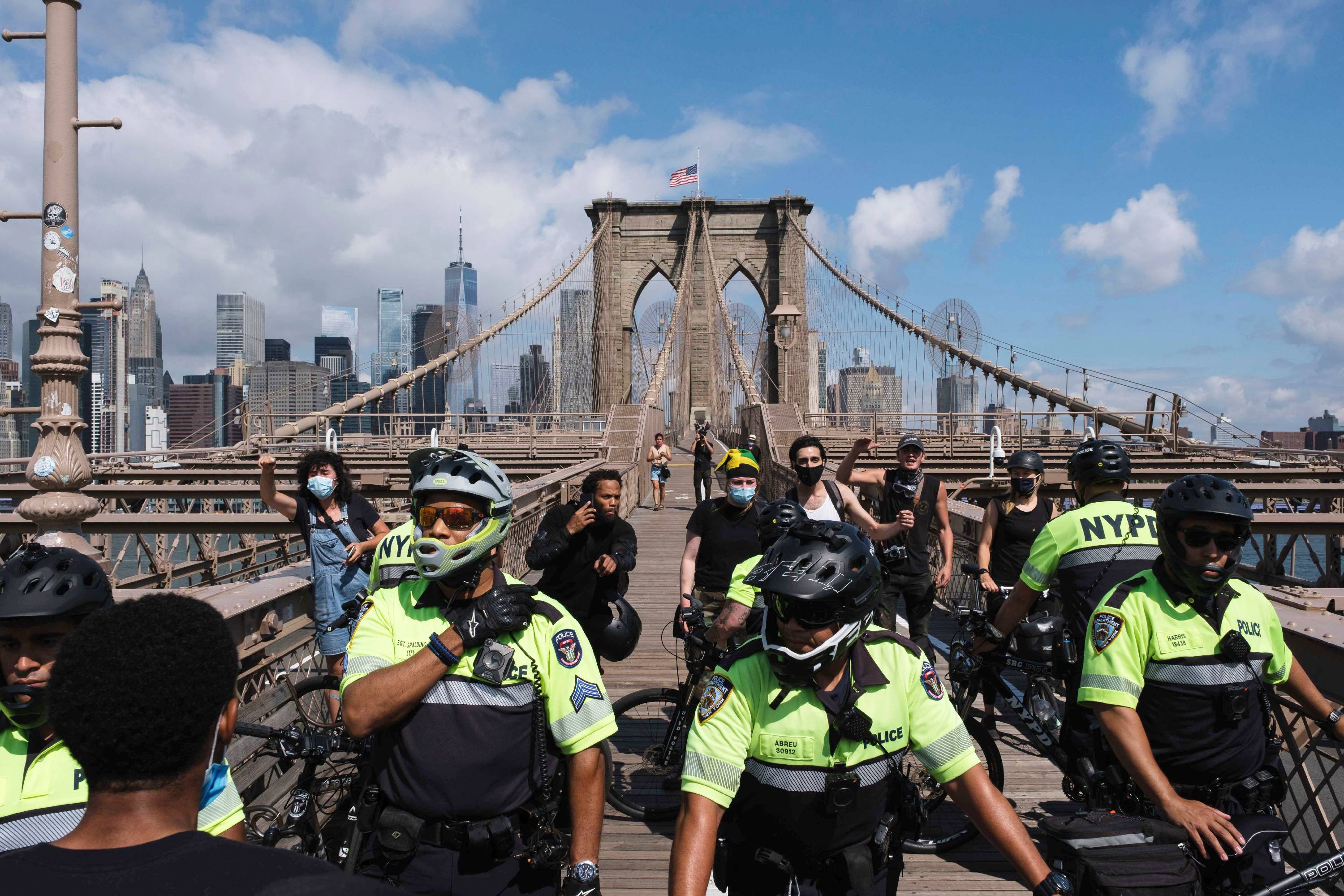
NYPD officers block the Brooklyn Bridge after the clash between officers and Black Lives Matter protesters. (AP Photo/Yuki Iwamura)
Three of the four officers Minguela accused were also cleared of wrongdoing. In fact, of the 197 excessive force complaints in Camden since 2014, just five were upheld.
Some also question whether Camden is really a good example of “defunding”. Most of the officers laid off by the city were then re-hired by the county. They were just paid lower salaries, since the county was a non-union department. The net result was that Camden wound up with more officers, not less.
Extended Interview: Camden County Freeholder Louis Cappelli Jr.
“That’s not a reimagining of public safety, that’s just ramping up and trying to modify and renovate policing and supercharging it,” says Philip McHarris, race and policing scholar at Yale University.
Cappelli agrees that to call what Camden County did “defunding” would be inaccurate.
“We actually have invested heavily into our police department,” he says. “We've invested in training; we've invested in technology, and we've invested in finding ways to make our police officers better community policing officers, so this defunding notion is simply wrong.”
From my bed I stand with the protesters.
Six years after he was injured, Xavier Ingram waits for his lawsuit to proceed. He also hopes the protests unfolding across America lead to a different kind of justice in the shape of police reforms.
“From my bed I stand with the protesters,” he says.
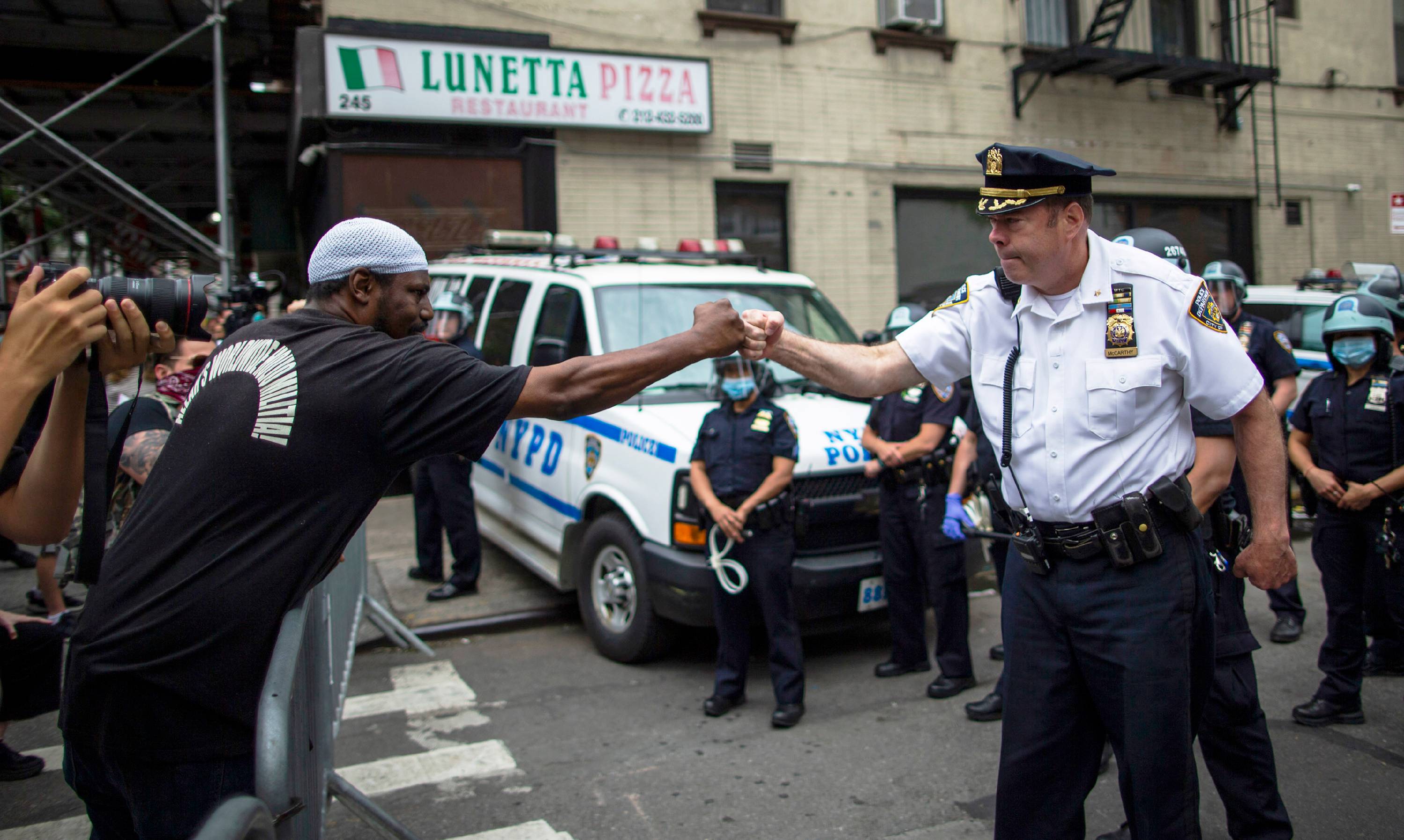
NYPD Deputy Police Chief McCarthy greets protesters as they take part in a solidarity march for George Floyd, Tuesday, June 2, 2020. (AP Photo/Eduardo Munoz Alvarez)
Different VisionsTo Philip McHarris, a race a policing scholar at Yale University, defunding the police is only a first step toward abolishing the current system and starting over.
“Policing is not reformable,” he says, “so if we really want to reimagine public safety, we have to do away with what it is and then rebuild something else.”
But McHarris says people shouldn’t be frightened by calls to abolish departments, because he says they would be replaced with others that would be more responsive. He imagines a system in which armed police would be reserved for cases in which there is a risk of imminent violence. Safety or conflict “intervenors” would handle less serious matters, while mental health professionals would serve as first responders for people in crisis.
Policing is not reformable, so if we really want to reimagine public safety, we have to do away with what it is and then rebuild something else.
Activists who truly want to do away with law enforcement hold a minority view, according to Professor Daniel DiSalvo of City College of New York.
“Defunding” has a very practical meaning to Newark Mayor Ras Baraka, who is cutting 5% from his city’s police budget this year and investing it in violence prevention programs. He says, “ultimately, it just means reinvest dollars that we spend at police departments and other areas of the city.”
To Derrick Jackson, a social worker who is employed by a police department in Michigan and lectures on how social work and policing can work cooperatively, Defunding is “about officers doing what they're good at, and then other folks in other professions really having the ability to do what they're good at.”
As for Patrick Colligan, the head of New Jersey’s largest police union, he says, “I'm not sure any of us know what (defunding) means yet.”
Those differing visions are reflected in the polls, which show that how Americans feel often depends on how questions are phrased. A recent Gallup polls shows 47% of people say they support reducing police budgets to invest in other programs. But when asked if they support total defunding, support drops to 15%.
Even police have noted that they are not always properly trained to deal with people experiencing mental health crises. Advocates claim defunding can help alleviate that, by increasing funding for community mental health programs, But how would people other than police officers respond to those situations?
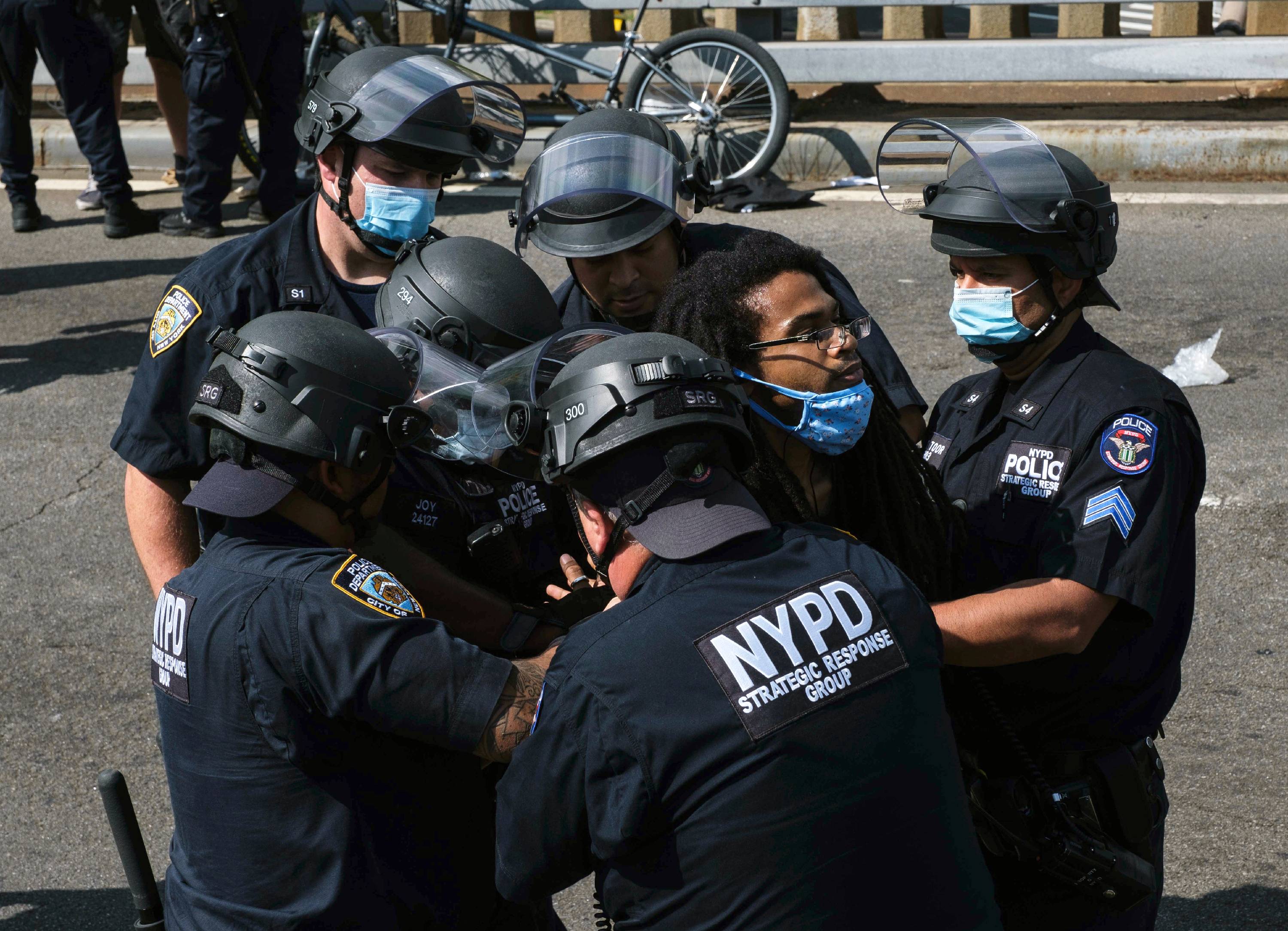
A Black Lives Matter protester is apprehended by NYPD officers on Brooklyn Bridge, Wednesday, July 15, 2020. (AP Photo/Eduardo Munoz Alvarez)
Jennifer Thompson of the National Association of Social Workers says more discussion is needed. “Are we talking about complete disbandment?” she asks. “Are we thinking about social workers coming in and being first responders? Until we get some real clarity about what we're really talking about and how funding might shift, it's hard to be able to respond.”
Jackson offers more concrete ideas. “If someone calls and it's a criminal thing, but it turns out that once a law enforcement officer gets there, it's really a mental health crisis, that's why it's important for officers to have that basic understanding of mental health and triage and then be able to call out, say the social worker to come out and take over,” he says.
Jackson also envisions social workers “riding along with officers and responding almost like what we would call the mental health SWAT team.”
“The problem is that a lot of these services go offline at five,” says Baraka. “And the only number people have is 911. When there are issues, and we have to be able to expand social services, so when people call them at one o'clock in the morning, a social worker can show up and not a man with a gun.”
Police are asked to do a lot in our cities today, everything for dealing with mental illness, and to dealing with homelessness for which they're not always well trained.
There were mixed opinions on one of the key issues of the debate. Is it possible to reduce funding on police and also reduce crime, by investing in other programs?
Yes, says McHarris, who insists “there's no correlation,” between police spending and crime. “There’s been $135 billion investment over the past 60 years with not much to show for it but an increased capacity for police to engage in harm and violence.”
“I don't want to shock you,” Colligan responds, “but there's been a budget crunch, especially here in New Jersey. And I don't know any department saying, ‘Oh, we have so many extra officers, we don't know what to do with them all’.”
DiSalvo strikes a middle ground. “Police are asked to do a lot in our cities today, everything for dealing with mental illness, and to dealing with homelessness for which they're not always well trained,” he says. “So there's some reason to think that perhaps lessening the burden on police and allowing them to focus maybe on more core tasks could have some positive effects.”
Project Credits:
Karin Attonito: Kane in Your Corner Producer
Anthony Cocco: Photographer/Editor
Walt Kane: Investigative Reporter
Frank Pokorney: News 12 Digital Executive Producer
Jeremy Settle: News Director, News 12 New Jersey
Chris Vaccaro: Vice President, News 12 Digital



























